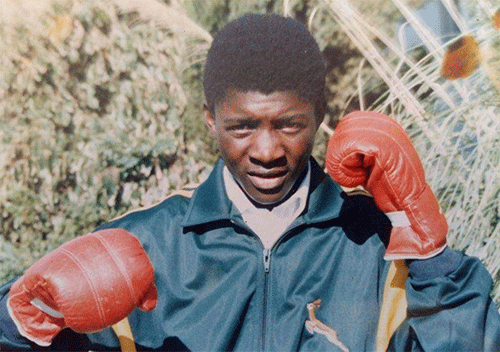Love him or loathe him, Albertus Katiti is a Namibian boxing icon and without a shadow of doubt, one of the most-fascinating leather traders of his generation. A much-reserved human being and one jolly good fellow of decent upbringing, his flawless brilliance in the boxing ring was something out of the ordinary.
Attaining the then much-treasured prestigious Springbok colours during the height of the South African notorious apartheid regime, let alone at the tender age of 20, was certainly not a walk in the park.
The introvert boy from Ruacana was one of only two boxers selected for the star-studded South African Springbok boxing team, alongside fellow compatriot Nestor ‘Sunshine’ Tobias.
Albertus ‘Ali’ Katiti was born on the 8th of August 1968 in Ruacana in the vastly populated Omusati region, situated northwest of Namibia.
As an enthusiastic amateur boxer, the soft-spoken now-retired boxer will go down in history as one of Namibia’s greatest amateur boxers of all time, having been crowned national champion in his weight category during an illustrious flawless boxing career that saw him represent his native land with great aplomb at provincial level.
A noted political activist and staunch card-carrying Swapo member since his formative years, the bantamweight hard puncher ranks amongst the finest leather traders the country has ever unearthed prior to Namibia’s democracy in 1990. Blessed with a decent height for his fairly lightweight, the ring-smart Ali also possessed a boxing IQ second to none.
In ordinary layman’s lingo, boxing IQ simply suggests pure boxing intelligence, which is the ability to adapt your mind to understand the technical aspects of the trade, subsequently conditioning your body to respond. It is what separates the best from the rest. It is also where the talent lies in boxing, much like other sporting disciplines.
Arriving on the local boxing scene at the same time when other emerging highly-gifted boxers also entered the fray, the tallish boy from Ruacana was destined for the big stage. Rubbing shoulders with fellow emerging leather traders in the mould of Tobias, Hiskia Swarts, Sackey Shivute, Bernhard Kamatoto, Salathiel Ntinda, Amukwa, Isaac Mbamba, and the late quartet of Abiud Kanambunga, Erastus Kambauruma, Ben Awaseb, and Hiskia Shigwedha, as well as the multi-talented former Blue Waters Football Club’s calculated centre back Dawid Chicken Kasaona, and many others, was certainly no mean feat.
Back in the day, boxing was used as a tool to develop character. Young boxers were taught scientific boxing, where one out-boxes, out-guesses, and out-manoeuvres the opponent, and where primitive passions are only a disadvantage.
Since boxing is one of the very few sporting disciplines whose primary objective is to inflict serious bodily harm to your opponent, would-be boxers were subjected to rigorous training methods to attain advanced stages of physical fitness through roadwork and stamina-building exercises.
Ali was amongst a galaxy of highly-gifted young boxers to be recruited by the revered Rössing Boxing Club under the guidance of former boxer George Uarotua Mukuaahima. Some of his celebrated stablemates were: Hiskia Swarts, Abiud Kanambunga, Ben Awaseb, Erastus Kambauruma, Noah Tjombonde, Sackey Shivute, and the multi-talented former Blue Waters Football Club and Brave Warriors’ cool-as-a-cucumber centre back, Dawid ‘Chicken’ Kasaona.
Boxing pundits and his admirers called him the Rolls Royce of Namibian boxing as he had very few peers, if any, in the business. Up to this day, records show that Ali is the only opponent who defeated the great Harry Simon twice during their amateur days. His other victims included Bernhard Kamatoto, Siegfried ‘Blackie’ Kaperu, Lidias Simon, and the hard-punching Robert Mutota.
He was crowned the undisputed national champion in the bantamweight division, and has represented his native land in the hotly contested South African Inter States Championships.
Ali was amongst the leading boxers ushering Namibia into a new era when the country finally gained her long-awaited independence in 1990. He was crowned continental champion and was destined to represent Namibia at her maiden appearance in the quadrennial All Africa Multi Sports Games in Cairo, Egypt in 1991, but was unfortunately forced to withdraw through injury.
Ali’s name was first on the list when Namibia made her maiden appearance at the quadrennial Commonwealth Multi Sports Games in Victoria, Canada 1994. However, he narrowly missed out on qualification for the Atlanta Summer Olympics in the United States (USA). The unlucky Namibian lost the decisive quarterfinal eliminator against a Ghanaian opponent in Tunis, March 1996.
Nonetheless, such was his popularity that he was duped the “Wetenskaplike bokser”, which, translated from pure Afrikaans, is “scientific boxer”. The dominant view amongst many boxing followers is that the astonishingly skilful boxer from Ruacana, could have easily walked blind folded into the then tough and demanding rigours in the paid ranks but sadly, age was no longer on his side.
Even though he did not realise his long-held dream of becoming a professional leather trader, Ali will go down in history as one of the most complete boxers of all time.


